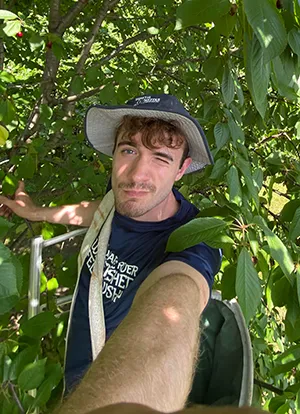Cultivating Change: Dylan Scollon 25’s Unexpected Journey in Prison Agriculture

“I want to bring greenery to urban spaces where it’s been systematically removed or underappreciated,” says Scollon. “It's about reconnecting people with nature for their own sake and for the benefit of the environment.”
Dylan Scollon ’25 never imagined spending his summer in a prison yard, toiling under the hot sun. But his experience in the Curran-Fromhold Correctional Facility (CFCF) greenhouse and orchard would prove as transformative as it was unexpected.
After surveying his options, including posts at prestigious research institutions, Scollon viewed the prison yard job as a “last resort.” But he soon came to see it as a journey that expanded his perspective on labor, justice, and personal growth.
“Looking back on it,” says the environmental studies major from Philadelphia, “it was the best possible outcome.”
Scollon heard about the job from his mother, who has worked at CFCF in Philadelphia for nearly 40 years. For his interview, he toured the grounds behind a guarded, barbed-wire fence.
Scollon's days began early in the morning, in the sun-drenched fields. It was grueling work, but felt natural for a lifelong lover of the outdoors and physical labor; Scollon had grown up mowing lawns and shoveling snow for his family and neighbors.
“I cannot have a job where I’m inside,” says Scollon. “I’d go insane.”
The job was divided into two key components: agricultural work and educational outreach. Scollon’s days typically began in the orchard, where rows of fruit trees — apple, plum, peach, and fig — needed constant attention. Whether he was on his hands and knees picking rotten fruit from the ground, climbing ladders to harvest bushels of apples, or pruning plants to ensure healthy growth, everything was done by hand.
Hours under the sweltering sun, hauling tons of fruit to be weighed and distributed, were the norm. Scollon gained a deep appreciation for the workers who do these types of tasks all year round, in places “where wages are low and profit is prioritized over safety.”
But the educational aspect of Scollon’s time at CFCF was equally important. Through a program run by Laura Cassidy, the sustainability manager for the city’s Department of Prisons, Scollon worked alongside incarcerated women in the orchard. The women received vocational training in sustainable agriculture, including how to identify pests, prune trees, and recognize when fruit was ready for harvest.
“Those who were excited to learn got to do so,” says Scollon, “and those who simply needed time to be outside, in these unexpectedly beautiful rows of trees, got to do so as well.”

By the end of the summer, Scollon (above) and the incarcerated persons harvested more than 11,000 pounds of food.
By the end of the summer, Scollon and the incarcerated people harvested more than 11,000 pounds of food, distributing it to local food banks across Philadelphia. That collective effort had a profound effect on Scollon’s perspective.
The more time he spent harvesting fruit by hand, the more he began to recognize the value of labor. And that’s something he believes is too often undervalued in society.
“Food should cost much more than it does,” Scollon says. “The amount of work it takes to grow, harvest, grade, and transport food isn’t reflected in the prices we pay at the grocery store.”
His summer experience also provided Scollon insight into the complexities of the American prison system. Working alongside the prisoners, many of whom were incarcerated for minor offenses, made him question the justice of the system.
“Many of the incarcerated people I worked with had dreams of bettering their lives,” says Scollon, a first-generation, low-income student from a self-described “chaotic background.”
“The prison system is broken, and these individuals are often given no chance to grow,” he adds. “The beauty of this program was that it gave them hope."
His experience ignited a deeper passion for environmental stewardship and sustainable agriculture. As he nears the end of his time at Swarthmore, Scollon now plans to pursue graduate school in a field that blends landscape design, education, and environmental restoration.
“I want to bring greenery to urban spaces where it’s been systematically removed or underappreciated,” he says. “It's about reconnecting people with nature for their own sake and for the benefit of the environment.”



